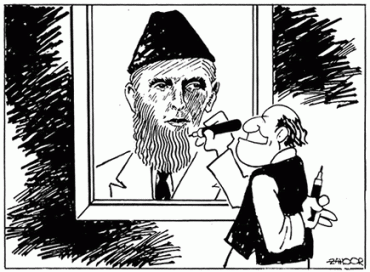Jinnah and the Islamic State – Setting the Record Straight – by Pervez Hoodbhoy
What did Quaid-e-Azam Mohammed Ali Jinnah, the founder of Pakistan, want for the country he was destined to create in 1947?

This essay originated from my lecture in Karachi in 2007, delivered at the invitation of the Jinnah Society in cooperation with the Oxford University Press of Pakistan.
What did Quaid-e-Azam Mohammed Ali Jinnah, the founder of Pakistan, want for the country he was destined to create in 1947? Surely I cannot say anything new on this venerable and much-discussed historical subject; the experts know much more. But, as we approach Pakistan’s sixtieth anniversary, the matter of Jinnah and the Islamic State is still a hot one. It is confounded both by the wishful thinking of my well-meaning liberal friends, as well as conveniences invented at different times by Pakistan’s military, political, and religious establishments. Therefore, it seems to me that objectivity, honesty, and clarity are still desperately needed if we are to clean out old cobwebs and chart a new course for the future of our country.
What is Pakistan all about? For decades, Pakistani school children have grown up learning a linguistically flawed (but catchy) rhetorical question sung together with its answer: Pakistan ka matlab kya? La illaha illala! [What is the meaning of Pakistan? There is no god but Allah!]. They have been told that Pakistan’s raison d’etre was the creation of an Islamic state where the Sharia must reign supreme.
Surely this has had its effect. A recent survey by the World Public Opinion.Org (April 24, 2007) found that 54% of Pakistanis wanted strict application of Sharia while 25% wanted it in some more dilute form. Totaling 79%, this was the largest percentage in the four countries surveyed (Morocco, Egypt, Pakistan, Indonesia) .
But was sentiment for Sharia and the Islamic State strong in 1947 among those who fought for Pakistan?
Mr. Jinnah’s thoughts inevitably enter the argument. This, of course, does not necessarily mean that Pakistan was, or is, obligated to become the fulfilment of his vision. Pakistan is much more than Jinnah and it will eventually go in the direction that its people want it to go. But it certainly is of the greatest intellectual and historical interest to ask two key questions:
a) Did Jinnah want Pakistan to be a Muslim majority state where individuals, whether Muslim or otherwise, would be free to live their lives more or less as they do in countries in the rest of the world?
Or,
b) Did Jinnah want an Islamic state? And, if so, what was his understanding of such a state.
These have always been loaded questions with various sides making excellent arguments for their own purposes. But it is time to stop cherry-picking and, instead, scrutinize the totality of Jinnah’s words and actions. Else, at the end of the day we shall end up merely reaffirming our existing preferences and prejudices .
To be sure, a dispassionate examination of Mr. Jinnah’s positions has been unusual in Pakistan because of the ideological needs of the state. Truth was an immediate casualty when General Zia-ul-Haq brought his new Islamic vision of Pakistan in 1979. Immediately thereafter, Mr Jinnah had to be entirely resurrected and reconstructed as an Islamic – rather than Muslim – leader.
This task challenged even the best of spin-masters. As perhaps the most Westernized political leader in Indian Muslim history, Jinnah was culturally and socially far more at ease with the high society of cosmopolitan Bombay and metropolitan London than with those who he led and represented. His Urdu was barely understandable. Nor were his culinary tastes quite those of strict Muslims. But the authorities of Pakistan Television took this, as so much else, in their stride. So, in the 1980’s, a steady stream of profound pieties emanated from a stern, sherwani-clad man who filled television screens across the country. Gone were his elegant suits from Seville Row, as was any reference to his marriage to a Parsi woman. Mr. Jinnah had miraculously morphed into a deep-thinking Islamic scholar.
An interesting consequence of the deliberate state-organized obfuscation was that many Pakistani liberals concluded that the truth must have been the very opposite. They insisted that that, in fact, Jinnah had envisioned Pakistan as a secular, but Muslim majority, country. As proof, they point to two of his oft-quoted speeches that suggesting a secular outlook. Delivered just before, and after, Partition, these had been slyly concealed from the public media during the Zia years:
“You are free; you are free to go to your temples, you are free to go to your mosques or to any other place of worship in this State of Pakistan.
You may belong to any religion or caste or creed – that has nothing to do with the business of the State…. You will find that in course of time
Hindus would cease to be Hindus and Muslims would cease to be Muslims, not in the religious sense, because that is the personal faith of each individual, but in the political sense as citizens of the State.
Courtesy: Chowk
No comments:
Post a Comment